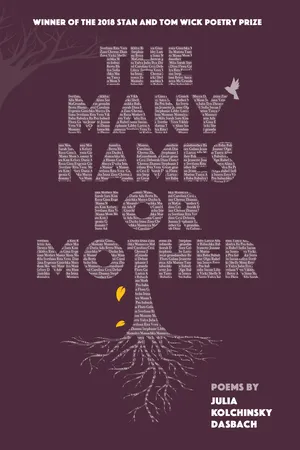![]()
I. Drowned
![]()
AGAINST NAMING
Let’s not name her or compare
flesh to fruit. Let’s joke instead
how she swallowed a seed and let it
grow inside her. Just imagine,
how heavy is that sound and what
it tastes like in ripe summertime heat.
I had no cravings though. Only wanted to touch
the cold or be touched. Polish berries carried
the winter, so I ate them by the bucket.
Gooseberries, currants, sour cherries, bursting
childhood in my mouth. A past made sweeter
by its being passed. My mother sweating through
tolkuchka—the little push ’n’ shove bazar—
to return home with a stained skirt and fruit
dangling from her ears and me, hungry
inside her. The Krakow market was a harvest too
this hottest July on record and in Oświęcim, the camps
didn’t know what to do with all the people
in such heat, so at the gates of Auschwitz
sprinklers appeared—for the children mostly.
And you, my love, were just about the size
of a heart inside me then, soft
and wanting. Water and a past
that isn’t this. One not passed down.
But I carried you there anyway. Against
my family’s urges. Against even your future
ones, maybe. Walked you miles across
black ground turned red then gray then left
for colorless. The dead beneath us
silent. The ones around us, growing.
And I sang to you of a golden city
under a paling sky with its magic garden
and single star and the flame-maned lion
waiting there. You listened, my love, perhaps
they did too, ashes rising in the creek and in the petals,
Birkenau’s waters and purple wildflowers,
its big book of names
from which we did not choose
to name you. Valen, valiant, strong, unmarked
by ancestry or first generation or Slavic or fruit.
But V, for the survivor who refused
to be named that, for the numbered and unnumbered
names unwritten and scattered there, for the woman
who made seeds grow as gorgeous
out of flesh as out of stone.
![]()
FOR WAR AND WATER
Everyone is having boys, my mother says.
That means war is coming. The way
it came in the old country—boys
rising out of the ice and cold
potato fields, boys laying bricks
and digging, wells and trenches
and bodies—boys out of other boys
like my boy, born the year before
cops killed even more black boys
and more boys killed other boys
for loving boys and more
swastikas showed up on walls
and more walls went up, invisible, where
once ran rivers. But a river
is not a boy. A river can either
run dry or bleed and everyone
will blame someone
darker or an animal, that gorilla
who dragged away the little boy
or the gator who stole another.
But in the water, they seem
so strong, resilient even, these boys
born months apart, these boys
who suck the water down, who beat it
with their tiny fists and kick as though
they’re running, these boys who grow
not knowing they were born for war
and that it’s everywhere
and there is no
outrunning water.
![]()
OTHER WOMEN DON’T TELL YOU
about the hair, how it falls out, webs
between your fingers and streams
in the shower and clumps on your pillow
and on the floor and in the hands of one
who still loves you. They say it’ll grow back.
Thicker even. But you don’t believe them.
They’ve lied before. And they don’t tell you
about the split, how you can fit
a fist between your left and right sides.
You can work to make it narrower, they say,
build back the muscles in your abdomen
and pelvic floor. It just takes time.
You can get it all back, they say, but you know
that is not the point. And you knew you’d be tired,
that the body can only keep up for so long.
They warned you days would be long but years
would fly and again, they were wrong,
because everything is flying and the rain
is coming down the way July had never known it.
And you think, my body was an ark once.
And you ask, would it still float? And in days,
your son will have breathed air as long as water.
And maybe Noah...
